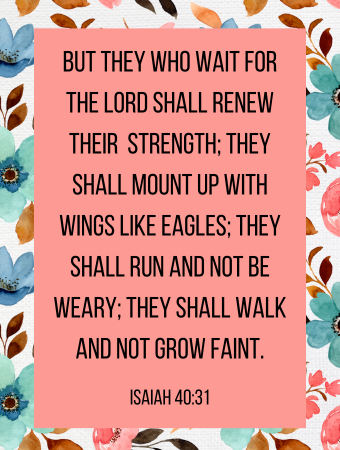
Sometimes in life, we pass through a season of waiting. The thing is, when your life is off track or your plans are delayed, the waiting feels never-ending. You can’t see through the cloud of pain or sickness or need or loss. You can’t see the next season. It’s as if there is nothing on the other side. The thing that you’re waiting on can easily consume your entire being. When you’re in pain, the only thing you want is relief. When you’re sick, the only thing you want is healing. In times of need, you want plenty. When suffering a loss, you want peace. In these moments, it can seem as if nothing else matters…only the thing that you lack. For a Christian, a season of waiting can prove to be a trial of faith, because fundamentally, we find ourselves waiting on God.

WHY WOULD GOD LEAVE US TO WAIT IN OUR SUFFERING?
In the Bible, Job endures trial after trial with no end in sight. Abraham and Sarah wait decades for a child. Noah waits for the rain to begin, for the rain to cease, and for the first sight of land. Joseph is sold into slavery and falsely imprisoned. He waits for a sense of purpose. Lazarus waits in death. Paul waits in prison. We have recorded proof that God’s people wait for the Lord. But, why? Why would God leave us to wait in our suffering?
THE STORY OF JOSEPH (GENESIS 37-50)
My favorite example is probably that of Joseph. I find comfort in his story because God’s purpose is so plainly clear. As a child, Joseph’s jealous brothers sell him into slavery. He’s then transported from Canaan to Egypt where he’s put to work in the house of a wealthy Egyptian. He serves there, until the Egyptian’s wife falsely accuses Joseph of assault. Joseph is then imprisoned. He waits in prison for years. And for what? What life could possibly await him outside the prison walls?
While in prison, God reveals to Joseph the meaning of specific dreams. Years later, when Pharaoh has a frightening dream, Joseph is able to interpret the dream for him. A famine is coming to the land of Egypt. After seven years of plenty, the land will see seven years of drought. Joseph tells the Pharaoh that he must prepare for the famine. The Pharaoh puts Joseph in charge of the preparations.
When the famine finally arrives, Joseph’s brothers come down from Canaan in search of food. Joseph recognizes his brothers and provides for their need. They do not recognize Joseph in the figure of the powerful Egyptian who stands before them. When Joseph reveals himself to his brothers, he speaks the words I hold so dear. “As for you, you meant evil against me, but God meant it for good, to bring it about that many people should be kept alive, as they are today.” Joseph found God’s greater purpose within the terrible, tragic circumstances of his life.
WAITING IS HARD
Not everyone’s story can be wrapped up with such a neat and tidy bow. Sometimes it’s easier to see the “why” is someone else’s life circumstances. I think it’s very hard to see the purpose in our own suffering. And it’s nearly impossible to see purpose while in the midst of pain. I think, like Joseph, if any purpose is to be seen, it’s often found on the other side of the waiting. The actual waiting is hard and lonely and sometimes very dark. But God is at work in the waiting.
Maybe the waiting is meant to change my heart. Maybe it’s meant to change someone else’s. Whatever the outcome, God has purpose in the waiting. We don’t see our stories in their entirety. God sees every moment at once, from beginning to end. He works all things for good, even when the evil of this world would do otherwise. God is always in control. He reigns over each moment. He reigns over each breath.

IF GOD IS AT WORK IN THE WAITING, WHAT SHOULD WE DO WHILE WE WAIT?
God wants us to be in a relationship with him. He wants us to talk with him. God wants us to pray. Sometimes it’s tempting to treat God like a genie and list our requests like wishes. God doesn’t promise to be be our genie. He doesn’t promise to answer “yes” to every prayer. God promises to listen. He promises that we are never alone.
When we pray, God can answer, “yes,” “no,” or “not right now.” The latter is the hardest to digest. It’s ambiguous. It elongates the state of waiting. But in that season, we can develop our relationship with God. When we pray, we can say, “Thy will be done.” Over time, God will help his will to be understood. He’ll help us to want what he wants. He’ll help us to accept what we cannot change. We can learn to trust the goodness of God. We can trust that his will for our life is good and right.
“GOD, GIVE ME STRENGTH TO ENDURE THE WAITING.”
We may not ever understand God’s purpose with perfect clarity. And yet, our hearts can submit to his will. We can pray, “Thy will be done,” and trust in his promises. We can do this because he loves each one of us. His purpose for us is good and right. Through prayer, his will, his purpose, can become our strength.







Leave a Reply
You must be logged in to post a comment.